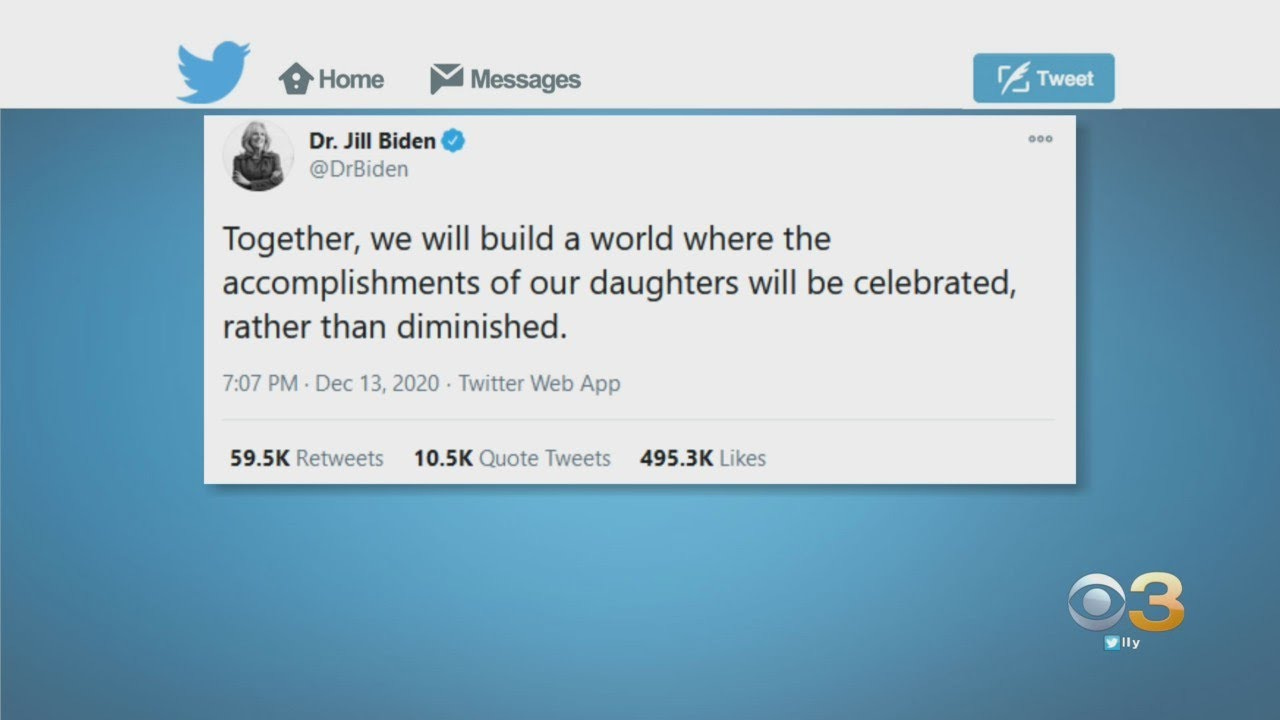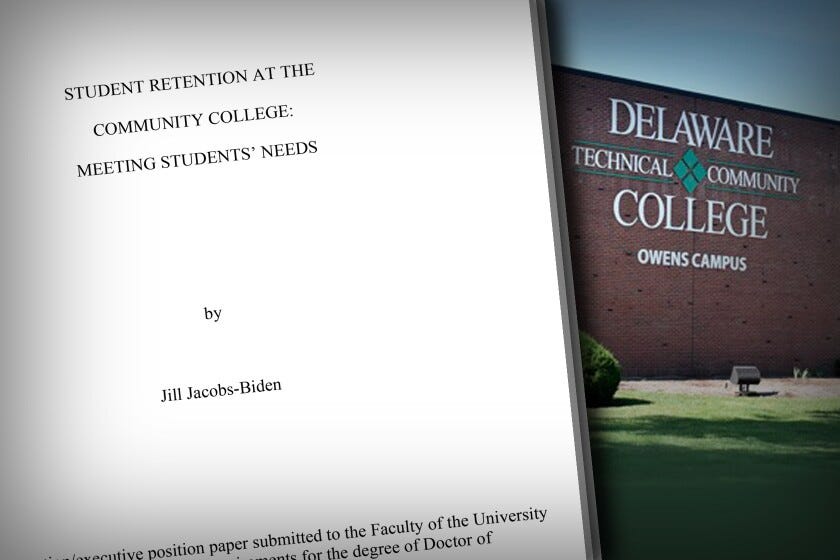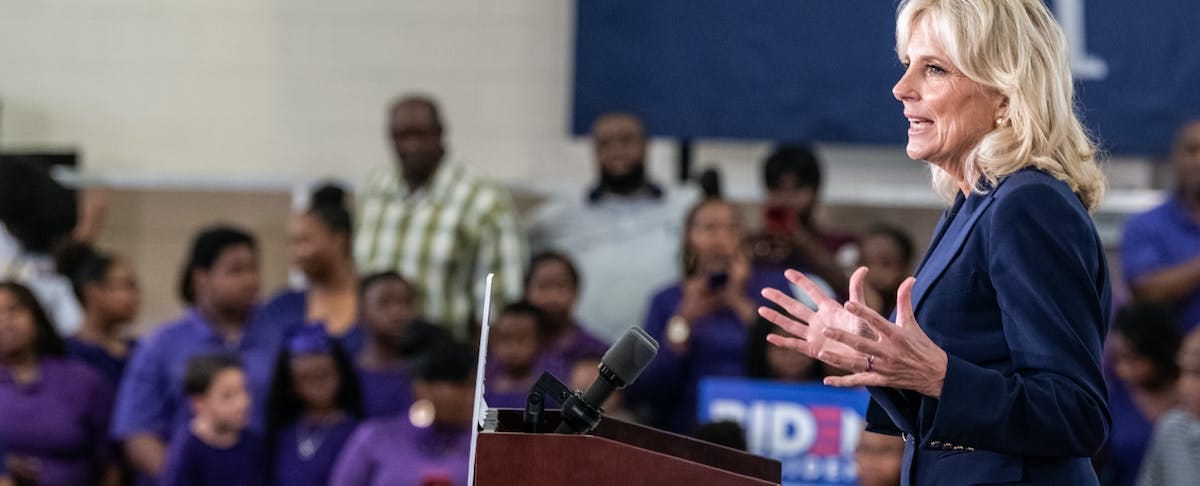I was reminded of the flap over Jill Biden’s doctorate while watching NFL football some weeks ago as a commentator pointed out that “Dr. Jill Biden”—not Mrs. Biden, note, or even the First Lady—was in attendance. It must be at her own insistence that she is given the public designation, and anyone who fails to applaud risks angry censure by the bien pensants.
The subject of “Dr. Jill” originally erupted even before her husband took office, when an opinion piece by the essayist Joseph Epstein called on her in December, 2020 to “drop the doc.” Epstein’s “Is There a Doctor in the White House? Not if you Need an M.D,” appearing in the Wall Street Journal, was not particularly critical of Jill Biden personally; he merely pointed out that it seemed “fraudulent,” perhaps even “a touch comic,” to call oneself “Dr.” when one’s doctorate was not in any medical field (Biden’s is in Education) and at a time when the PhD “has been diminished by the erosion of seriousness and the relaxation of standards in university education generally.” As it happens, there are few living writers more erudite than Epstein, a man who could run intellectual circles around Dr. Biden with one foot tied behind his back.
The same cannot be said for the many white knights who immediately amassed to attack Epstein with all-too-predictable charges of misogyny. Whereas Epstein’s piece had been mild and self-deprecating, focused on the changing requirements for the PhD, the irate responses were mean-spirited and doctrinaire, fueled by a reckless self-righteousness regularly found when the cultural wind fills one’s sails. Debra Silverman, in the comments section of the article, huffed that “The WSJ should be ashamed of its right wing opinion pieces like this; especially when they denigrate women.” Another commenter, Sarah Fraser, advised “Joe” that the academic appellation Dr. “spills over [from academia] to command respect for positions hard won, especially for women.”
Going a step further, Doug Emhoff, husband of Kamala Harris, tweeted that Epstein’s article “would never have been written about a man,” adding that Jill Biden “earned her degrees through hard work and pure grit” and that she was “an inspiration” to many across the country. Northwestern University, where Epstein had taught for 30 years, made a public statement distancing itself from his “misogynistic views” and promptly removed his bio profile from its website. The English department at Northwestern, which had never awarded any degrees to Biden or had anything to do with her academically, strongly defended her right to claim “her doctoral credentials and expertise.” Even Dr. Jill weighed in with a self-congratulatory tweet asserting that “Together, we will build a world where the accomplishments of our daughters will be celebrated, rather than diminished.”
Epstein had not diminished her personal accomplishments, which he acknowledged were likely “hard-earned”; he had merely pointed out that attaining a doctorate, especially in the laxest of all disciplines (even perhaps laxer than Gender Studies), was not nearly the achievement it had once been, and that it was rare for those with doctorates in non-medical fields to insist on being “Doc.”
He was right. Even CNN, reporting on the story in a manner intended to show up Epstein as an antiquated woman-hater, mentioned that its stylebook reserves “Dr.” for medical doctors. The American Bar Association has guidance about whether holders of the Juris Doctor degree (most American lawyers, including Joe Biden himself) should use “Dr.” (generally not, according to the guidance). Many public figures, including former DNC chairman Howard Dean and conservative political commentator Charles Krauthammer have doctorates but rarely called “Dr.” (Dean was actually an M.D.) Pretending that Epstein’s objection to Biden’s title had anything to do with bias against women was pure ideological poppycock.
And what about that degree?
Given that the centerpiece of a doctorate is the doctoral dissertation or thesis, it is fair to look at Biden’s dissertation/executive position paper, submitted to the University of Delaware when she was 55 years old, as evidence of her oft-touted “hard work” and “expertise.” Epstein had not commented on the thesis except to say that its title, “Student Retention at the Community College: Meeting Students’ Needs,” was “unpromising.” In fact, the whole more than lives down to the title.
Warning: what follows is probably far more than most readers will want to know about Biden’s thesis.
Perhaps mercifully, Biden’s discussion of student “retention” at Delaware Technical and Community College, where she taught for many years, is short: 79 pages of double-spaced text, not including the bibliography, the surveys (of students, general faculty, counsellors, and English faculty) and sets of interviews. These bring the whole to a mere 130 pages. Such a brief offering would not have been considered anywhere near sufficient for the awarding of a doctorate in any of the academic departments I have worked with and for. (My PhD, though, is in English, not Education).
More seriously, the content is not intellectually rich, well-written, or even coherent (more on this later). Its key idea, successful student “retention,” is never defined. What is a reasonable retention rate, and how do we know? Is it assumed that all students have the ability to succeed at a community college? Is there a necessary trade-off between high standards and high retention? Such questions are not even broached.
Though the dissertation uses a few terms specific to the discipline of Education, such as “institutional alignment” (the process by which students come to feel connected to their school), the argument, if it can even be called one, is shockingly simplistic: students succeed at college when their “needs” (not only academic but also social, psychological, and even physical) are met. No ranking of needs is attempted, and no other educational theories are considered. The conclusion is that Delaware Tech should track each student’s successes or difficulties by surrounding him or her (pronouns were not yet a thing) with a team of supportive instructors, counsellors, mentors, tutors, and advisers, and by providing opportunities to socialize, exercise, interact, and seek advice.
Not all dissertations are truly original (most aren’t), but Biden’s isn’t even adequate. Her literature review notably fails to identify any disagreements or debates in educational theories of retention. In explaining her methodology, Biden shows no critical awareness of the biases or limitations of her approach. At the center of her dissertation is discussion of a survey she gave to evaluate how well students’ needs were currently being met at Delaware Tech. The major assumption of the survey—that first-year students know what their needs are—is never interrogated or even defended.
Many of the questions in the survey were leading ones, and Biden’s interpretation of the answers is not always strictly accurate. Accuracy matters a great deal in a thesis claiming to be grounded in students’ and instructors’ lived perspectives. For example, a question was asked about the benefit to students of having a psychologist on campus: “In your opinion, would a campus psychologist be helpful to students?” (p. 43). The only two possible answers were yes or no. It would take a rather determined, even willfully disagreeable, student to decide that no one—ever—would find it helpful to consult a psychologist. But it is hard to conclude with Biden that “When pre-tech students were asked if a campus psychologist was needed, 123 out of 159 (77 percent) responded affirmatively.” To say that something offered could be helpful is not the same as saying it is needed. The same applies to the leading question about the utility on campus of a Wellness Center.
Discussion of a separate survey about students’ experiences with advisors was also less than convincing because of interpretative imprecision. Biden made much of the fact that students tended to rank advisors at the low end of the scale when asked about personal interactions, such as whether the advisor “encourages their growth and development as an individual” or was interested in “discussing long range goals” (p. 52). It’s not clear, though, whether students (or the college administration) clearly expected or had any right to expect advisors to demonstrate such personal and holistic interest. In particular, Biden’s conclusion about the students who rated the advisors on the low end of the scale that “These students are the alienated students who could be addressed through early intervention” was not evidently accurate or justified (p. 55).
I found it interesting that faculty members’ responses to survey questions revealed a set of concerns rather different from Biden’s, creating a tension in the thesis that was not squarely addressed. Biden reports that “Family problems were cited as the most common reason for students to leave Delaware Tech, followed by the unpreparedness of students and their work-related problems. Other related reasons listed by faculty reflect a sense of frustration by the instructors regarding students’ commitment to their education” (p. 66). These comments are quite distinct from the retention theories the dissertation supports. If students are intellectually unprepared for their classes and lack “commitment to their education,” then it is not at all clear that having a Wellness Center or a school psychologist will contribute to student success.
Perhaps not surprisingly, Biden’s emphasis tended to coincide with the (therapeutic and progressive) orientation of the educational literature. She offered that “Counselors validated that students need to feel connected to their institutions whether through participating in activities, mentoring, or providing for other student needs. Students need to feel that Delaware Tech exists and revolves around them – that faculty and the administration value them as students and individuals and strive to meet their individual needs” (p. 58). Meeting each student’s “individual needs” is a tall order, even an impossible one, at a college that does not even require a high school diploma for admission.
Might it not be better and more reasonable for students to believe—and find it to be true—that Delaware Tech exists and revolves around the pursuit of skills and knowledge, inviting students to make that their emphasis also? In response to serious and somewhat intractable learning problems (Biden notes that many students “are not readers,” for example [p. 58] and frequently have trouble identifying the main idea in a paragraph [p. 26]), the dissertation falls back on buzz: make the student feel valued, make the student feel recognized as an individual. This is at once too much and far too little. Even enormously costly personal tutoring cannot make a successful college student out of someone who lacks basic reading and writing ability, or a basic commitment to hard work.
Given that Dr. Biden taught writing skills for many years, her dissertation’s grammatical and word choice errors and problems with paragraph coherence are alarming.
Take a look, for example, at the following paragraph about students’ abilities, in which it is not clear whether Biden agrees or does not agree that high schools are failing to prepare students for college:
“The logical conclusion is that high schools are graduating students who are ill prepared for the rigors of college. Yet the problem is much more complex than that. Many community college students were not enrolled in college preparatory programs in high schools; many come from vocational educational programs for which community college is a logical step. Many are older students who have returned to school after having children or changing careers and are seeking upward mobility. Others may have dropped out of high school. The reasons are numerous, yet the gaps in education are pervasive. The State of Delaware is small enough that for students who are matriculating from high school to Delaware Tech, the transition should be almost effortless. A concerted effort should have occurred years ago to prepare low achieving students for community college programs. Yet, too often, they struggle and fail.” (p. 16)
Ultimately, it seems that Biden supports the opening “logical conclusion” that high schools are not doing their job. Why, then, does the next sentence indicate that the statement is inaccurate or inadequate (“Yet the problem is much more complex than that”)? Some of the sentences that follow neither clearly support nor contest the initial statement. Biden likely knows what she means, but I don’t think most readers will. And why should it matter that Delaware is a small state? How would size make preparing students for college any easier, given the vast diversity of skills and backgrounds that Biden has earlier enumerated? And what is her point about the students who drop out of high school? This is a textbook example of a disunified paragraph in which the author has not succeeded in focusing on one main idea or showing logical connections between statements.
Fundamental word-level errors are also all too common. In the second sentence of the first page, we are told that “The needs of the student population are often undeserved [sic], resulting in a student drop-out rate of almost one third” (p. 1). She clearly meant “underserved,” as she gets it right 5 pages later. This is a simple typo that spell check wouldn’t find, but it’s not the only mistake that makes Biden’s prose difficult to read. Here are a few others that are representative of the whole:
“In response to the needs of the community and to the growing number of adult learners, the community college became a multi-faceted, divergent [sic] institution” (p. 3). She meant “diverse.”
“Toward the latter part of the nineteenth century, ‘in 1892, Harper demanded the upper and lower divisions of the University of Chicago’ (Witt et al., 1995, p. 14); the lower level was a precursor of two years of pre-college work” (p. 8). Words seem to be missing here, and the meaning is unclear.
“Usually, children are diagnosed with learning disabilities in elementary school and school staffs [sic] work with those individuals and their doctor as they progresses [sic] to graduation” (p. 32). There are two number errors in the sentence.
“[…] Student retention rates skyrocket [sic] if there are no safeguards in place to help students cope with all they are trying to handle” (p. 35). She meant, I assume, “plummet” rather than “skyrocket.”
“Part of their underpreparedness involves the fact that they are not readers; thus their comprehension, vocabulary, and awareness of syntax and sentence structure is [sic] lacking. When asked to read out loud, many refuse or stumble over work [sic] pronunciation” (p. 58-59). Subject-verb agreement error.
“The retention data from both, however, was illusive [sic] and therefore could not be seriously considered” (p. 66). She meant “elusive.”
“Students need a place where they can find class information, build friendships, acquire knowledge regarding campus activities due to work and childcare schedules” (p. 77). A mixed construction.
There are more, but I trust the point is clear. It is disconcerting to think that Jill Biden failed to catch these errors in proofreading—even more so to realize that the dissertation’s multiple examiners at the University of Delaware, who certified its quality, also failed to flag them.
Is this the worst doctoral dissertation I have read? Yes. It offers nothing that can be considered in-depth analysis or intellectual argument. Is it weak in comparison to other dissertations commonly accepted in Education faculties? That I do not know. Regardless, it certainly fails to justify the praise bestowed on Biden by her many defenders, including former First Lady Michelle Obama, who called Biden “a brilliant woman who has distinguished herself in her profession.”
It certainly seems that nothing is easier to play than the “sexist” card. Biden family spokesperson Michael LaRosa condemned the Wall Street Journal for publishing Epstein’s “disgusting and sexist attack” by asserting that “If you had any respect for women at all you would remove this repugnant display of chauvinism from your paper. It didn’t matter that there was nothing disgusting or sexist in Epstein’s commentary; neither did it matter that he was far kinder than he might have been. To “respect” women in our feminist-compliant age, it seems one must never under any circumstances injure the pride of even one of the most vain and pampered specimens.
The bombastic defenses of Dr. Jill Biden demonstrate that unlike in the popular folktale, any man who dares say “The Empress Has No Clothes” is promptly beaten into the dust for his temerity.








Biden’s is an EdD, not a PhD. The former is a professional degree aimed at improving practice as a professional educator, often a school district superintendent.
It bears little resemblance to the academic -- not professional-- research degree that is the PhD, which often leads to being a university professor.
Both degrees have a worthy place but should not be seen as equal in academic rigor or accomplishment.
I love Janice! The first two individuals I started following online years ago were Janice Fiamengo and Colin Flaherty. Unfortunately, Colin is no longer with us, but he told the truth just like Janice.